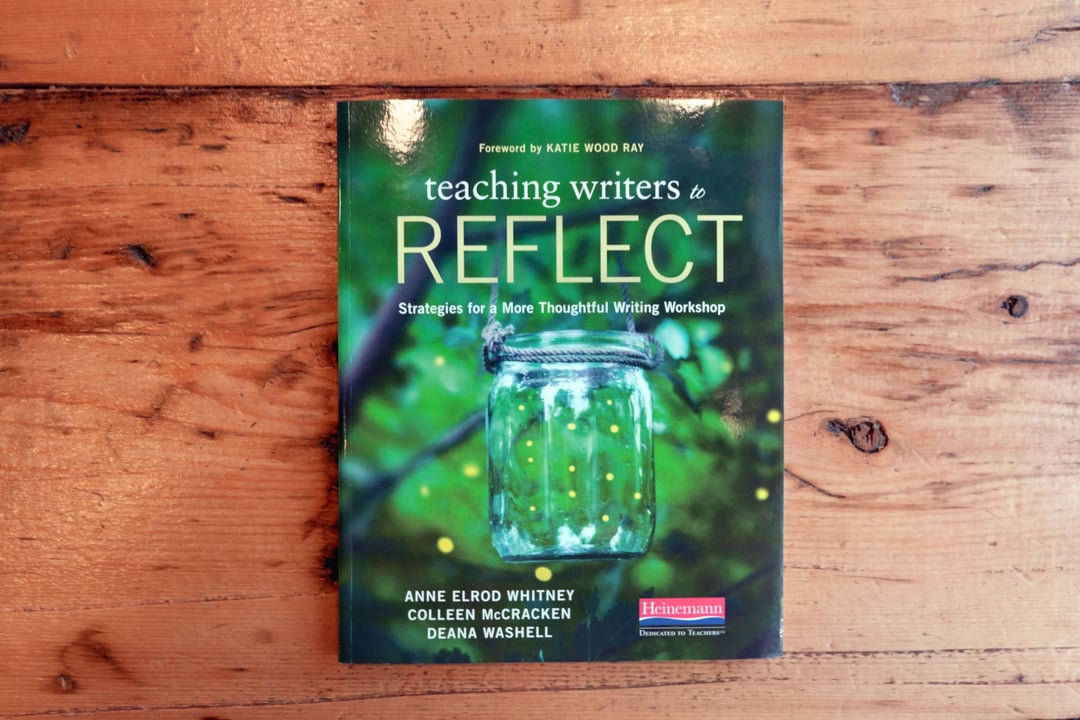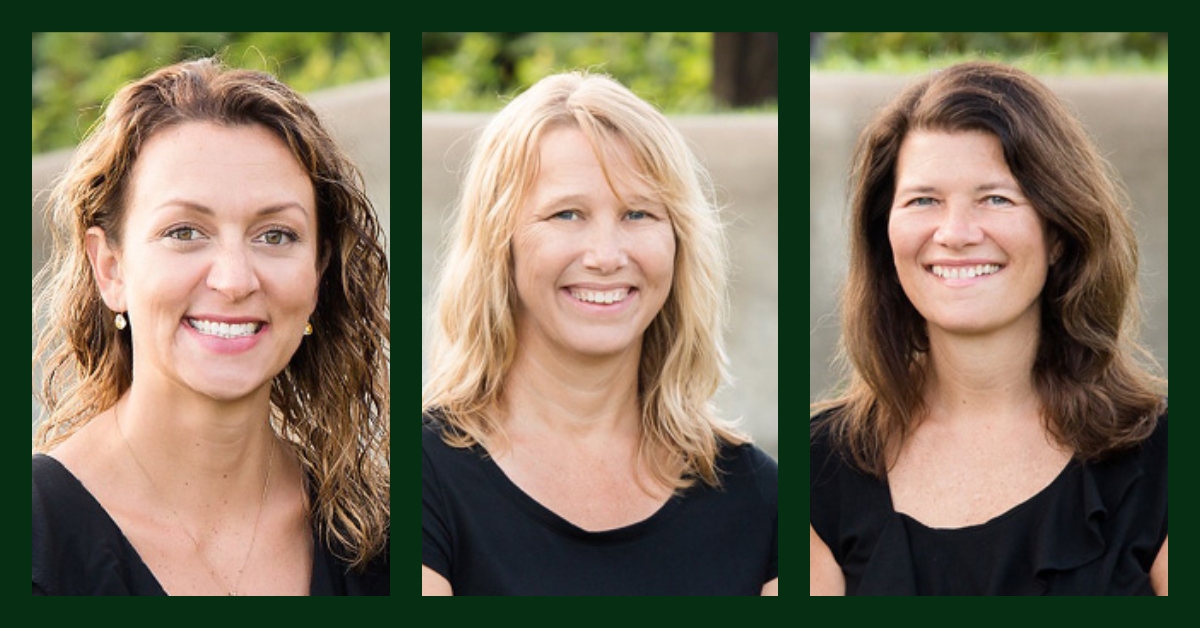
We are, by nature, reflective. We all think back on how a conversation went or maybe how we could do something differently if even another chance, but how do we teach reflection in writing? 
 Today on the podcast, we’re talking with Anne Whitney, Colleen McCracken, and Deana Washell, co-authors of “Teaching Writers to Reflect: Strategies for a More Thoughtful Writing Workshop.” Reflection helps students build their identities as writers, learn what to do when there’s a problem in their writing, and making writing skills transferable. Katie Ray writes in her introduction to the book that the elements of teaching reflection is what’s missing in many classrooms.
Today on the podcast, we’re talking with Anne Whitney, Colleen McCracken, and Deana Washell, co-authors of “Teaching Writers to Reflect: Strategies for a More Thoughtful Writing Workshop.” Reflection helps students build their identities as writers, learn what to do when there’s a problem in their writing, and making writing skills transferable. Katie Ray writes in her introduction to the book that the elements of teaching reflection is what’s missing in many classrooms.
We started our conversation on why we need to teach reflection in writing…
Below is a full transcript of the episode...
Anne: What we've learned is that it's possible to do things, and even to do them well without really knowing why we're doing them or knowing how we did them, and that's a problem because if you're going to do the successful things that you did again in the future, you really do need some meta-awareness of what went on. Kids are really, for the most part, very compliant and they try really hard to do what we've asked them to do, and so a lot times they will successfully complete a process that we've instructed them through without really taking ownership of that.
So the book is about engaging kids in doing what they do more thoughtfully, so that they are aware of their actions and so that they can learn from those actions.
Colleen: We also hope that the tools that we're teaching them are not just like this once in a moment tool, but something that they can continue to use, and so knowing when and where the skill is something that they can use again in writing or even, you know, I just feel like right now we're teaching persuasive, how do I talk to my parents about different things, and that they have a reflection piece about when I could use this, how would they go, to kind of enable them to find other spaces to use them again in the future.
Deana: And I think part of it as well is like building writer identity. We want them to see themselves as writers, and to know as writers that writing can sometimes be hard. They will experience success, but as writers they have some control over what they get down on paper and how they put it on paper. So, we feel like that is also an important part, developing writer identity and having them really take ownership of their work.
Brett: Where does reflection take our writing?
Anne: Reflection takes writing from a one-time experience that you do in the classroom, because we're at school and we do what we're asked, into your own mind and heart as your own possession. So through reflection you get from, just completing activities to actually owning those activities and building them into a sense of who you are as a writer.
Deana: I think students can better understand themselves as writers, as Anne said, I mean I think sometimes in classrooms and I think that this happened a lot in our classrooms as we started out, students would complete a writing prompt or task that we asked them to do it right, and they were trying to in a way to please the teacher, what does the teacher want me to do that's what I'm going to do, and what we tried to do I think is hand the power back to students.
Brett: You write specifically in the book that we need to teach reflection and not just ask for it, and you reference that in the older grades there's a certain moment where students understand the concept of reflection but when we're working with third grade or when we're working with the younger age we really need to teach reflection, so how do we teach reflection and not just expect it or not just ask for it?
Colleen: All three of us have the lucky fortune of in some way teaching college students and we have also found that we actually need to teach them how to reflect
Brett: Oh interesting
Colleen: We all three teach pre-service teachers who are coming into the profession and part of their job and their work while they’re in this pre-service year is to reflect on things that happened and we have done seminars and things with them about learning what we actually mean when we say “to reflect”, to actually really take a moment to think back and try to remember what happened and to try to do their best to describe it. It's very helpful for them as well. It's interesting that since doing this work we've noticed that really spans all of the grade levels
Anne: A lot of the things we do in the book are really consistent with the research on writing as reflective practice in all kinds of fields so the writing that, as we mentioned, pre-service teachers do, keeping a journal as your student teaching for example. Or the writing that nurses or therapeutic practitioners are encouraged to do. Writing where you process your experiences. The research with adults is pretty clear that people get better at that with a little bit of feedback along the way, it's one thing to say "Oh, keep a journal it's gonna help you learn", it's another thing to be helped to journal in the ways that are most effective or the most productive of recent. It's the same thing with kids, if you say to kids "Oh, think on this", that's nice but it's better if you can say "Let me show how how to think on this", it's like anything. If we expect people to be able to do it well we need to show them how
Deana: We do a lot of modeling for reflection as well and a lot of thinking aloud as writers ourselves for our students, trying to break it down for them and try and build in opportunities to reflect on an ongoing basis. Even if it is just a simple task at the end of a writer’s work here, have students stop and jot down what was one thing that worked really well for you during writing today and what is one area that maybe you struggled with. Just trying to build in opportunities to reflect and model that reflection as well as fellow writers.
Anne: Yeah, that idea of struggle is something I really want us to talk about. So often at school, and I think in adult life too, we act like to do something well is the only way to do it. If we experience something that is difficult for us we think we're doing it wrong cause it shouldn't be hard.
Brett: Hm-mm
Anne: Look at reading, so often the strong reader or the good reader is the kid who can read the fastest, and the reader who's struggling looks at that fast reader and thinks “Oh it's easy for him or her”, when truly I think many times the best reader or the strongest reader is the one who is really getting in there and digging into a text and struggling and re-reading and not understanding and having questions about things, and going back and really digging in, in an active way. I think that's the stronger reader, but what that reader's doing doesn't look so easy. It's the same thing with writing. I think when we started asking people to reflect, we'd say “Okay, well what was that like for you?”, and they'll say “I think it was good”, and as we've gone further with our practice we've learned that we really have to show the children how we sometimes find writing difficult.
We need to talk about problems that we have as writers when someone expresses a struggle or a difficulty to us we have to say to that kid, “Yeah, that's hard for me too”, and really honor that. The idea is not to linger on struggle but it's to legitimize struggle as a daily part of writing, if you look at a professional writing, somebody who does it every day and has written with tons of success, that person still finds writing really difficult. It never exactly gets easy
Deana: Just as you build a community of writers, the notion that going back to the idea of struggle is that we all have different successes and different struggles with writing, it helps children feel that they can be vulnerable right, and be honest with themselves and also with the larger writing community within the classroom context.
Brett: One of you said earlier, you know the importance of identity for the writer, how does reflection really help us build identity for a writer?
Anne: That really happens through these three phases or components of reflection that we talk about in the book, remembering what has happened, describing what has happened, and then using that to take action relative to what has happened. Think about a memory that you have in your life that's important to you, part of how it becomes important is by remembering it, remembering it with others, recalling it and telling that story. For example, a family story you know maybe there was the year the turkey dropped off the platter and hit the floor, that is an experience to everyone who was there, but it becomes a treasured memory, or it becomes a form of identity for the family after the family sits around telling that story and laughing about it and naming it “the turkey incident”, and having inside jokes about that incident, the experience becomes meaningful and gives the family identity through remembering what happened, through sharing language about describing it and then eventually for taking action on that and in the case of Thanksgiving maybe that action is just making a joke about it every time.
But for writers it's remembering to do different once they've had a learning experience, or it's remembering to do again something that was helpful or successful, drawing on past experiences as we go forward.
Brett: You write in the book that by teaching reflection teachers can also better see their students’ needs. How so?
Deana: I don't know if it goes back to the notion where you can see a child, like writing away on a piece of paper, but we kinda get a glimpse as to what's going on in their brain, if they can verbalize to us the writing process that they're going through. Different things that they're experiencing success with, different things that they're struggling with, like for instance, there was a particular student who, over the course of the year really became very honest with his reflections and when we were sitting down doing our… we had built-in assessments that are district mandated that we have to do, and this is a kid who is sitting there staring at a blank paper when I knew he was capable of so much more, was able to articulate his thoughts and say, “You know Mrs. Washell, it's very difficult for me to respond to a prompt that you give me, I need to have choice, I need to have ownership in my writing”, so I didn't feel like that necessarily writing pass was an accurate representation of who he was.
The conversation that we had around the task gave me more information as to who he was as a writer.
Colleen: I also feel like their reflection kind of gives us hints as to more of what they think they're working on and sometimes that can be really powerful as teachers, about where to help support them because we might look at their writing and think “Oh, you know they need to add more details”, or certain things like that, and through those reflection pieces we can learn from them what their hopes are for that piece of writing and when they don't know why then it kind of gives us ways of thinking about what can we help that student to do. And so I think just having some of those reflection pieces, especially the ones from the beginning of the year when we're trying to get to know our kids and we ask them about who they are as writers it's so interesting to hear what they say about themselves in what they think they do well as writers, what's hard for them and what they have been successful doing.
It just kind of gives us ideas as we go forward what we're working with, with the kids
Deana: And I think one other thing as well is, sometimes when I sit down with a child, and I've looked over his or her work, in my mind I'm thinking well “You know what, maybe this child needs to focus on further developing this setting, or needs to build up more dialogue in the story”, and I think it's so much more powerful that comes from them and sometimes they surprise me with different things that they feel they need to work on that can be much more complex than I would have perceived.
Anne: Absolutely, I think a lot of this comes from an ideology that Deana and Colleen and I all share, and that is trusting the kids as good sources of information about their own learning. You know, we have multiple sources of information for knowing how a kid is doing and for knowing what his or her needs might be, I really think the child ought to be one of those sources and we trust kids and we honor their sense of their experiences and by teaching reflection, part of what we're doing is we're teaching them how to express those needs right, in ways that ultimately they can get help for themselves. They're not going to be in Ms. McKenna's room forever, they're not going to be in Mrs. Walsh's room forever, but they are forever going to need to be able to call upon resources to get what they need as a writer or just as a learner. Part of the value of reflection is in making their learning needs visible to us, but part of it is about teaching them how to go and get what they need down the road
Brett: Well, and one of the ways that you do that is you talk a lot about the importance of description in relation to reflection, why is description so important?
Anne: It's huge, how can you ask for something that you don't know how to name? It's like going traveling in a country where you don't know the language, and you wanna order food, or for example you have an allergy, and you need to ask questions about it in order to ensure that you're served food that you can eat, but you don't know the words for anything. It's nearly impossible, so you really have to have language for what you are doing, so you can share with others
The other thing is that it's so-, in part it's by telling a story that we learn what that story is about. Let me give you an example, if you go to confer with a student who's writing and that kid is struggling, and they say “I'm having a really hard time”, Okay, that student now knows, and you know that she's having a really hard time, but if that student has words to say “I'm having a hard time because I'm worried that my ideas aren't good”, or “I'm having a hard time because I have too many ideas, and I can't select among them”, or “I'm having a hard time because I'm concerned about this reader who's not going to understand what I'm saying", you have so much more to work with there than you do if you just say "I'm having a hard time" right.
The better we can name things, the more power we have over them.
Deana: And I think too it's going from vague to more specific, for instance if a child says in a narrative writing unit “I don't think my stories is as interesting as it could be”, specifically what do they need to do to push their writing forward, so it could be adding more details, using more descriptive language, further building up the setting of the story. We try and give them a toolbox of terms that writers would use to talk about what they do.
Anne: It's also the shared language of the discipline of writing. When the kids go down the hall to PE and play volleyball, they learn the words of volleyball like “Serve”, or “Bump”, or “Spike”, or whatever and it's the same thing with writing, there's specialized language that we use in the community of writers and if your kids are going to be members of that community, if we really mean that then we have to help them have the tools that they need to really take part in the conversation with us.
Brett: One of the other things, you know speaking of the tools that you mentioned throughout the book, one of the tools that I really love in the book are the call outs that you have on invitations to reflect. Tell us a little bit about those.
Colleen: I think one of the things that we tried really hard in writing this book as we worked through many of the aspects is that we really do want this to be accessible for teachers no matter where they are and while we realize that we are very fortunate that we can co-teach across second and third grade that we're fortunate that we can work so closely with Anne through the University, we know that there's a lot of places where that may not be the case but still we do think this work is important, and we do think it's possible and so just inviting people to think through what's happening in their practice, in their classroom, and just giving them things to think. We though that would be a really important step in the book creation
Anne: Just in general, teaching goes better the more you can think about it, it's really hard to get good at something without reflecting on what you've been doing, what went well that day, what was difficult that day, that's true for writing, and it's true for teaching. As Colleen mentioned, a lot of times teachers are busy, we've got way too much do to, the emails are coming, the phones ringing, the children are walking in the door, your colleagues poking their head in, there's not really a moment to settle down and do tons of intentional reflection.
We were really careful about showing the ways that you can be reflective as a teacher through your day using the tools that are at hand, like a post-it, or the notebook you're already using with kids, or the planning tools that you're already using and kind of poke reflection in there at easy small points throughout the day rather than it being another thing on your to-do list.
The last thing we want, and the last thing we can do ourselves is add on an entire task to our day, instead it's about building reflection in to everything we do.
Colleen: I think one of the really special things about the work that came from this book is our triad approach and how all three of us really, we're so crucial in our conversations. I think our conversations were really the biggest piece in helping both the book, but also the teaching that we do to happen and that I guess would just be my hope for other people, that they can find someone to have conversations with because without question, I've learned so much as a teacher just in talking with both Deana and Anne and I just feel like that's really elevated what we're able to do with kids.
…
Learn more about Teaching Writers to Reflect at Heinemann.com
 Follow us on Instagram @heinemannpub to stay up to date on the latest books, your favorite authors, and upcoming events!
Follow us on Instagram @heinemannpub to stay up to date on the latest books, your favorite authors, and upcoming events!
 Anne Elrod Whitney (top) is Professor of Education at the Pennsylvania State University. Colleen McCracken (center) is a second-grade teacher and Deana Washell (bottom) is a third-grade teacher at Easterly Parkway Elementary School in State College, Pennsylvania.
Anne Elrod Whitney (top) is Professor of Education at the Pennsylvania State University. Colleen McCracken (center) is a second-grade teacher and Deana Washell (bottom) is a third-grade teacher at Easterly Parkway Elementary School in State College, Pennsylvania.




